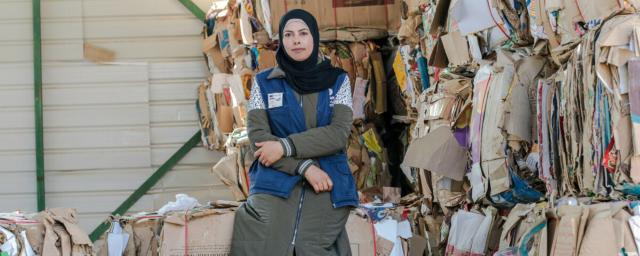
Hamda, technical team leader in recycling project in Za’atari Refugee Camp, Al Mafraq. (Photo: Monther Abutarha/Oxfam)
Jordan, officially the Hashemite Kingdom of Jordan, is a country in the Southern Levant region of West Asia, classified by the United Nations as an upper-middle-income country. Its strategic partnerships and forward-looking policies present opportunities to strengthen local capacities and promote inclusive growth.
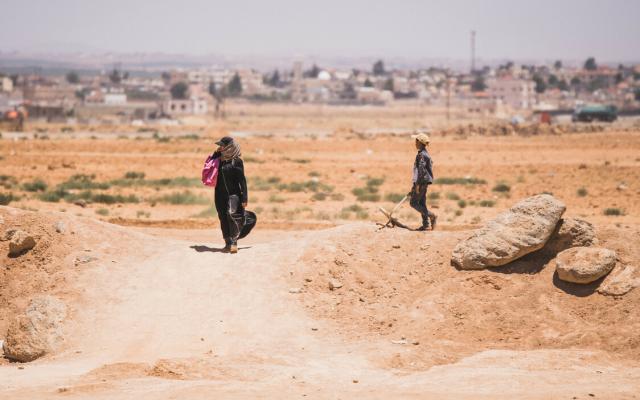
Women and child return from to the Za’atari Refugee Camp through the berm. (Photo: Mathieu Laprise/Oxfam)
Challenges
Jordan faces challenges driven by regional instability, economic strain, and the responsibility of hosting over 1.3 million Syrians, including more than 500,000 registered refugees. High unemployment, especially among young people and women, combined with water scarcity and the climate crisis, place significant pressure on national systems and resources.
Oxfam plays a vital role in these efforts through humanitarian programming, long-term development work, and advocacy for sustainable, locally led solutions.
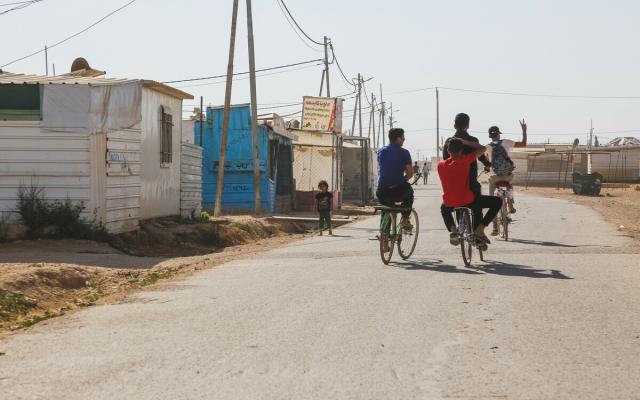
A group of young refugees in Za’atari Refugee camp riding bicycles. (Photo: Mathieu Laprise/Oxfam)
Impact on People
The compounded effects of economic instability and resource scarcity predominantly affect women, children, and refugees. Many families struggle to meet basic needs such as food, healthcare, and education. Refugees often face barriers to employment and social integration, leading to increased dependency on humanitarian assistance.
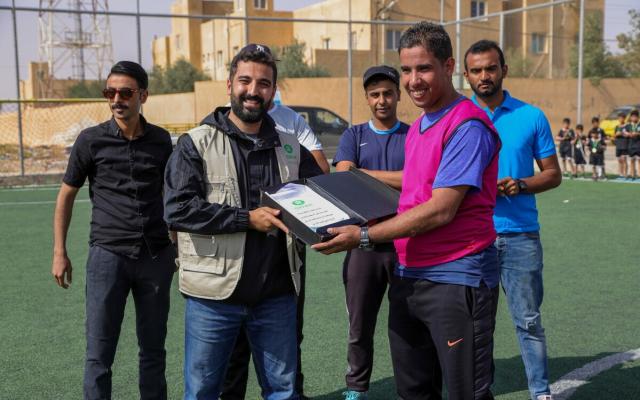
Oxfam team delivers an award to the Badia Vultures football coaches. More than 55 children aged between six and 17 come to the academy for football training and other recreational activities, free of charge. (Photo: Monther AbuTarha/Oxfam)
Oxfam’s Role
Oxfam has been registered in Jordan since 2013, building on its longstanding presence in the country since the 1990s. By leveraging our expertise in community engagement, capacity strengthening, and innovative programming, we aim to create sustainable solutions that support marginalized groups and enhance livelihoods.
Our Work
Our priorities are to promote climate, economic, and gender justice, while increasing advocacy efforts. We use the evidence our projects generate to influence change at different levels—from behaviors to laws and policies—in close coordination with other actors including the UN, local and international civil society and local authorities.
Climate Justice
We help Jordanians respond to the shocks and stresses of climate change by supporting water conservation, better waste management, and hygiene promotion. We engage communities and run national campaigns to promote reducing, reusing, and recycling of waste. We also support local authorities in engaging communities about solid waste management. At the same time, we innovate and experiment to find sustainable solutions and support Jordan’s transition to a green economy.
Economic Justice
With our partners, we support Jordanians and refugees across the country to access jobs, start businesses, and become entrepreneurs—especially women and young people. We offer mentoring, skills training, and better access to economic opportunities. We also help social enterprises and small- and medium-sized businesses create jobs through incubation, technical assistance, and access to finance. Through research and advocacy, we push for fair policies that include refugees, women, and people living with disabilities, and promote safe, decent work with fair wages.
Gender Justice
Women are at the heart of everything we do at Oxfam. Together with women’s rights partners in Jordan, we work for a future where all women can enjoy their rights freely, make their own choices, and live free from violence or fear. We focus on issues like gender-based violence, unpaid care work, and access to legal aid.
We also work to improve access to sexual and reproductive health services. We support local groups to challenge harmful social norms and behaviors that prevent women and other vulnerable groups from realizing their rights. We advocate with stakeholders for better laws, policies, and services that protect and support women.
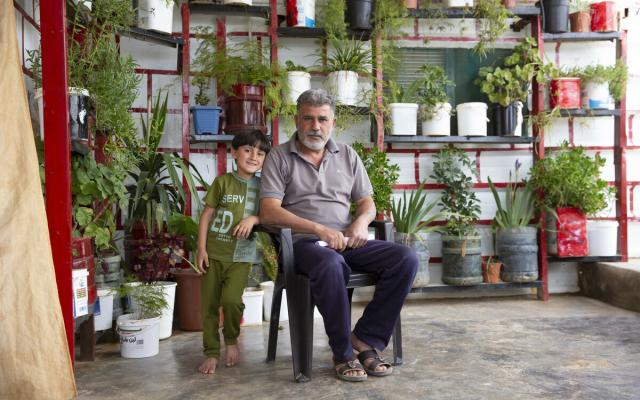
Abu Mohammad* and his son in their front yard, with the plant's pots. (Photo: Monther AbuTarha/Oxfam)
*Name has been changed
Looking Ahead
It is essential to enhance funding for humanitarian and development initiatives, particularly those targeting marginalized groups. Strengthening partnerships with local organizations will also be critical in scaling successful interventions. Continued advocacy for policy reforms that protect the rights of refugees and others is necessary to ensure sustainable improvements in living conditions and economic opportunities. Oxfam remains committed to being a connector, convener, and influencer, ensuring that local actors are at the forefront of development.